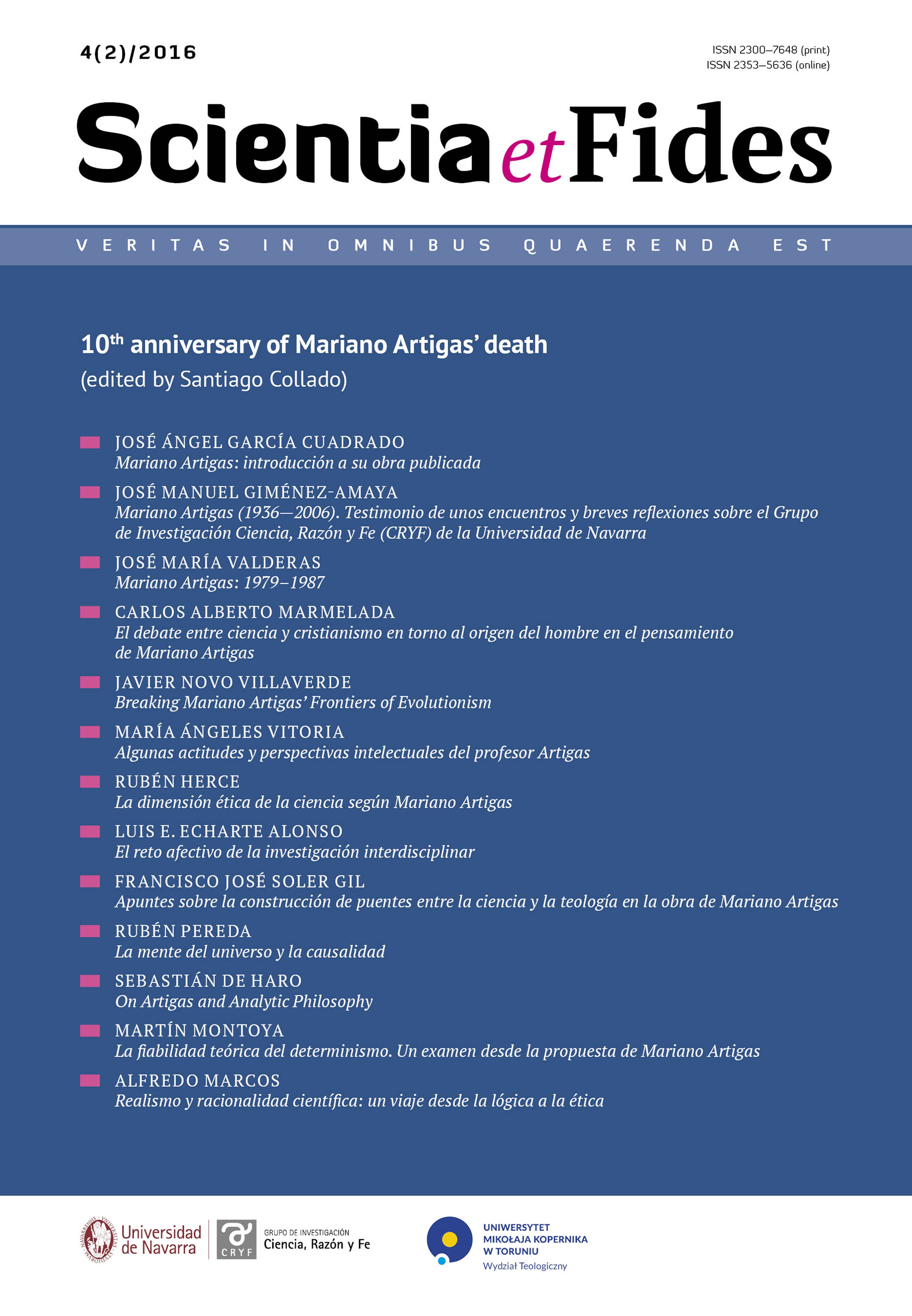Realismo y racionalidad científica: un viaje desde la lógica a la ética
Keywords
critical rationality, scientific realism, Artigas, Duhem, PopperAbstract
Realism and scientific rationality: A journey from logic to ethics
Mariano Artigas’s relationship with the work and person of Karl Popper went through three phases. The first one ends with Artigas’s book entitled Karl Popper: búsqueda sin término (1979). Artigas found in Popper a powerful source of inspiration. But he also stated several discrepancies with Popper, especially in regard to the thesis of the conjectural nature of knowledge. However, Artigas saw the possibility of a fruitful dialogue with Popper. The second phase begins with the correspondence between Artigas and Popper, and culminates with the publication by Artigas of a book entitled El desafío de la racionalidad (1994). Here, some affinities and differences appear in regard to the theory of rationality of both authors. The third phase was opened precisely in 1994, with the reading by Artigas of several Popperians hitherto unpublished texts. These texts revealed themselves crucial to the understanding of the Popper’s position on the problem of rationality. It became clear that the Popperian idea of critical rationality has its support and inspiration more in the field of ethics than in the domain of logic. This finding left open a path of greater proximity and sympathy between them, as it is stated in Artigas’ book Lógica y ética en Karl Popper (1998); a path that, for biographical reasons, they were unable to travel together, but that represents a challenging invitation for today’s philosophers.
References
Artigas, M. 1979. Karl Popper: búsqueda sin término. Madrid: Editorial Magisterio Español.
Artigas, M. 1988. Prólogo a Pierre Duhem: La filosofía de la ciencia en sus orígenes por. M. Artigas, 11-17. Barcelona: PPU.
Artigas, M. 1989. Filosofía de la ciencia experimental. Pamplona: Eunsa.
Artigas, M. 1992. La inteligibilidad de la naturaleza. Pamplona: Eunsa.
Artigas, M. 1994. El desafío de la racionalidad. Pamplona: Eunsa.
Artigas, M. 1998. Lógica y ética en Karl Popper. Pamplona: Eunsa.
Artigas, M. 1999. “Lógica y ética en Karl Popper”, seminario impartido el 13 de enero de 1999 en el Grupo de Estudios Peirceanos de la Universidad de Navarra (accesible en http://www.unav.es/gep/AF69/AF69Artigas.html).
Chillón, 2015. “¿Popper aristotélico? Logos, crítica y sociedad abierta”. Daimon. Revista Internacional de Filosofía 65: 147-162.
Marcos, A. 1988. Pierre Duhem: La filosofía de la ciencia en sus orígenes. Barcelona: PPU, (con prólogo de Mariano Artigas).
Marcos, A. 2012. Postmodern Aristotle. Newcastle: Cambridge Scholars Publishing.
Peirce, Ch. S. 1955. “The Scientific Attitude and Fallibilism”. En Philosophical Writings of Peirce, editado por J. Buchler, 42-59. Nueva York: Dover.
Popper, K. 1961. La miseria del historicismo. Madrid: Taurus.
Popper, K. 1973. La lógica de la investigación científica. Madrid: Tecnos.
Popper, K. 1974. “Replies to my Critics”. En The Philosophy of Karl Popper, editado por P. A. Schilpp 964–1197. Chicago: Open Court.
Popper, K. 1977. Búsqueda sin término: una autobiografía intelectual. Madrid: Tecnos.
Popper, K. 1994. La sociedad abierta y sus enemigos. Barcelona: Paidós.
Putnam, H. 1988. Razón, verdad e historia. Madrid: Tecnos.
Downloads
Published
How to Cite
Issue
Section
License
CC BY ND 4.0. The Creator/Contributor is the Licensor, who grants the Licensee a non-exclusive license to use the Work on the fields indicated in the License Agreement.
- The Licensor grants the Licensee a non-exclusive license to use the Work/related rights item specified in § 1 within the following fields: a) recording of Work/related rights item; b) reproduction (multiplication) of Work/related rights item in print and digital technology (e-book, audiobook); c) placing the copies of the multiplied Work/related rights item on the market; d) entering the Work/related rights item to computer memory; e) distribution of the work in electronic version in the open access form on the basis of Creative Commons license (CC BY-ND 3.0) via the digital platform of the Nicolaus Copernicus University Press and file repository of the Nicolaus Copernicus University.
- Usage of the recorded Work by the Licensee within the above fields is not restricted by time, numbers or territory.
- The Licensor grants the license for the Work/related rights item to the Licensee free of charge and for an unspecified period of time.
FULL TEXT License Agreement
Stats
Number of views and downloads: 506
Number of citations: 0



